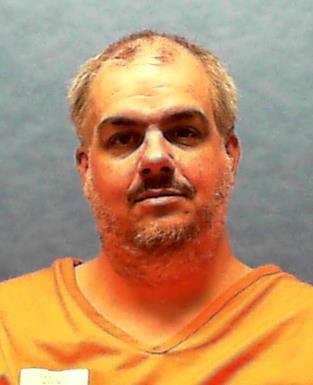
Almost 25 years to the day he abducted, assaulted and murdered a Miami woman relaxing on her lunch break, Michael Anthony Tanzi is set to pay for his crime with his life, in an execution that his lawyers, activists and religious officials say should not be carried due, in part, to the condemned inmate’s size.
Tanzi, 48, is scheduled to be executed via lethal injection at 6 p.m. Tuesday at Florida State Prison in Raiford, where demonstrators with the Floridians for Alternatives to the Death Penalty will hold a vigil ahead of what will be the eleventh execution of the year in the U.S.
Attorneys for Tanzi — who has confessed to kidnapping, sexually battering and murdering 49-year-old Janet Acosta on April 25, 2000 — unsuccessfully argued in court filings that Florida’s lethal injection protocol would violate a constitutional ban on cruel and unusual punishment for the “morbidly obese” inmate who has severe chronic sciatica, among other ailments.
Last week, Florida Supreme Court rejected Tanzi’s claims in a 23-page opinion, deeming his last-ditch effort to avoid the death penalty as “untimely and meritless,” noting that he’s had medical conditions dating back to 2009.
Attorneys also failed to prove that lethal injection would present a “substantial and imminent risk” of serious illness or needless suffering for Tanzi, according to the ruling, which referenced prior challenges to the use of a sedative that begins the state’s three-drug execution procedure.
“This court has repeatedly upheld Florida’s lethal injection protocol, including the etomidate protocol,” Tuesday’s opinion reads. “Additionally, this court has considered and rejected similar arguments based on obesity and IV procedures.”
Etomidate is a short-acting intravenous anesthetic that the state uses to begin the lethal injection.
Tanzi’s attorneys did not return multiple requests for comment ahead of Tuesday’s scheduled execution. The condemned inmate has also declined interview requests, Florida Department of Corrections officials told Newsweek.
But the hulking, confessed killer — listed in court documents as 6 feet 3 inches tall and weighing as much as 383 pounds — believes life without the possibility of parole would be a more fitting punishment for Acosta’s brutal slaying.
“I’ve taken full responsibility for my actions and I’m feeling content,” Tanzi wrote to a pen pal last year. “Prison saved my life. I would have never made it to 30 years old. I thank God for reentering my life and giving me the opportunity to find balance and change through His word.”
Tanzi said he explored “dangerous paths” after not fitting in as a child, ultimately leading him to death row. But he remains “grateful” for those who have “helped him grow into a better person” while incarcerated.
“Without them, I don’t know what kind of person I’d be today,” Tanzi’s letter continued.

Florida Department of Corrections
Florida Governor Ron DeSantis signed Tanzi’s death warrant last month, condemning him to death for the murder of Acosta, a longtime employee at the Miami Herald, after he kidnapped the 49-year-old during her lunch break at the Japanese Garden on Watson Island, court records show.
Tanzi, then 23, attacked Acosta after asking her for a cigarette as she sat alone “in her favorite place” in her van. He then promised not to hurt her if she cooperated, but threatened to “cut her from ear to ear” with a razor if she resisted, court documents indicate.
Tanzi proceeded to drive Acosta through Miami, heading south to Florida City, where he forced her to perform oral sex and warned he’d cut her if she “bit him,” court document show.
Tanzi, who promised to release Acosta once they arrived in Key West, later stopped to use her ATM card and bought a roll of duct tape and razor blades at a hardware store in Tavernier. He then drove 40 miles to Marathon, where he again used Acosta’s ATM card, and continued further south until reaching Sugarloaf Key, where he started looking for a remote area to kill her, court documents show.
After driving 130-plus miles in Acosta’s van into the Florida Keys as she was bound and gagged, Tanzi strangled her on Cudjoe Key, roughly four hours after the initial kidnapping. He then dumped her body in a secluded area masked by mangroves and went on a shopping spree using his victim’s bank card.
Tanzi was arrested two days later in Key West, where he told officers why he killed Acosta.

Florida Department of Corrections
“If I had let her go, I was gonna get caught quicker,” he told detectives, according to court documents. “I didn’t want to get caught. I was having too much fun.”
Tanzi also revealed that Acosta had been aware he planned to kill her.
“‘I told her, I says, I can’t let you go,'” Tanzi recalled. “If I let you go, I’m gonna be in a lot of trouble.”
Acosta’s sister, Julie Andrew, 72, plans to witness Tanzi’s execution on Tuesday. Newsweek will also be reporting from inside the death chamber as the lethal injection is carried out.
“I won’t call it closure, but yeah, it will be done,” Andrew told Newsweek late last month while declining further comment.
Acosta, a supervisor for the Herald‘s makeup department, had worked at the newspaper for 25 years and routinely parked her van at the Watson Island park to eat lunch, read books or take a nap before returning to her job, court documents show.
Repeated attempts to reach Tanzi’s mother were unsuccessful, but a cousin who asked not to be identified said he had been anti-social as a child and previously diagnosed with mental health disorders.
A physician who examined Tanzi following his arrest determined he suffered from bipolar mental disorder that had been undiagnosed since childhood, as well as substance abuse disorder, a sexual disorder and anti-personality disorder, court records show.
Tanzi, who pleaded guilty to first-degree murder, carjacking and other charges, was sentenced in 2003 after a jury unanimously recommended the death penalty. Ten executions have been carried out in the U.S. over first three months of 2025, according to the Death Penalty Information Center (DPIC).
Robin Maher, DPIC’s executive director, said many currently condemned inmates had been sentenced decades earlier when public support for capital punishment was much higher. The impact of mental illness, trauma and other mitigating factors on their behavior was also much less clear, she said.
“Twenty years ago, we had five times the number of new death sentences that we had last year,” Maher told Newsweek. “And we had more than double the number of executions 20 years ago. So that shows you how very different the world is today and for many of the people being executed, it’s a good indicator that they would not be sentenced to death today.”
Maher also spoke of something death penalty opponents have long mentioned as one of the reasons for their opposition to capital punishment: geographic arbitrariness, or the uneven application of the death penalty based on jurisdiction. For example, just five states — Texas, Georgia, Alabama, Florida and Missouri — accounted for 83 percent of all U.S. executions between January 2015 and April 2020, according to the Washington-based nonprofit.

Florida Department of Corrections
“It’s very real,” Maher said. “If you commit a capital crime, even a terrible crime in a state like Minnesota or Vermont, you would not be eligible for the death penalty. But if you commit the very same crime in Texas or Alabama, you would very likely be subject to the death penalty.”
A little over half of U.S. adults support the death penalty, according to a Gallup poll released in November, representing a five-decade low.
“These are the decisions of elected officials independent of how their constituents may feel,” Maher said. “And there is lots of evidence that suggests that voters have other priorities for their taxpayer funds and other ways that they can keep their communities safer rather than the tremendous resources that need to be expended to seek and obtain a death sentence.”
Florida has the distinction of leading the nation in the number of death row exonerations since 1973, followed by Illinois and Texas, DPIC data shows.
Three days after Tanzi’s scheduled execution in Florida, Mikal Mahdi, 41, is set to die by firing squad in South Carolina, where he fatally shot an off-duty police officer in 2004.
Two other executions are also scheduled in Texas and Alabama later this month, while four are set to occur in May in Florida, Texas, Tennessee and Louisiana, according to DPIC.
The Florida Conference of Catholic Bishops, meanwhile, is pleading with DeSantis to spare Tanzi’s life. Michael Sheedy, the group’s executive director, said commuting his sentence to life without parole allows the state to “serve the requirements of justice” without vengeance and recognizes his childhood neglect and trauma.
“Abused by his own father before being left fatherless at the age of eight, and sexually abused for the next five years, Mr. Tanzi’s life was consequently severely disordered,” Sheedy wrote in the March 31 letter.
“He became a chronic alcoholic due to being raised amid a family of alcoholism and sexual abuse, which drove him to act out sexually and turn to drugs and alcohol,” Sheedy continued. “This included drifting in and out of homeless shelters and institutions. He now credits prison with saving his life and takes full responsibility for his actions.”
Those factors do not change the “terrible nature” of Tanzi’s crime, nor the need for him to be removed from society, but urge a “spirit of mercy,” Sheedy insisted.
DeSantis’ office did not return repeated inquiries by Newsweek. Tanzi will be taken to the death chamber at 6 p.m. Tuesday, where he will be strapped to a gurney and given an opportunity to make a final statement to the witnesses behind the glass in front of him. He will then be injected with the three-drug cocktail that will end his life.
Editor’s Note: Newsweek‘s Joshua Rhett Miller will be reporting from inside the death chamber as a media witness to Tanzi’s execution on Tuesday.
